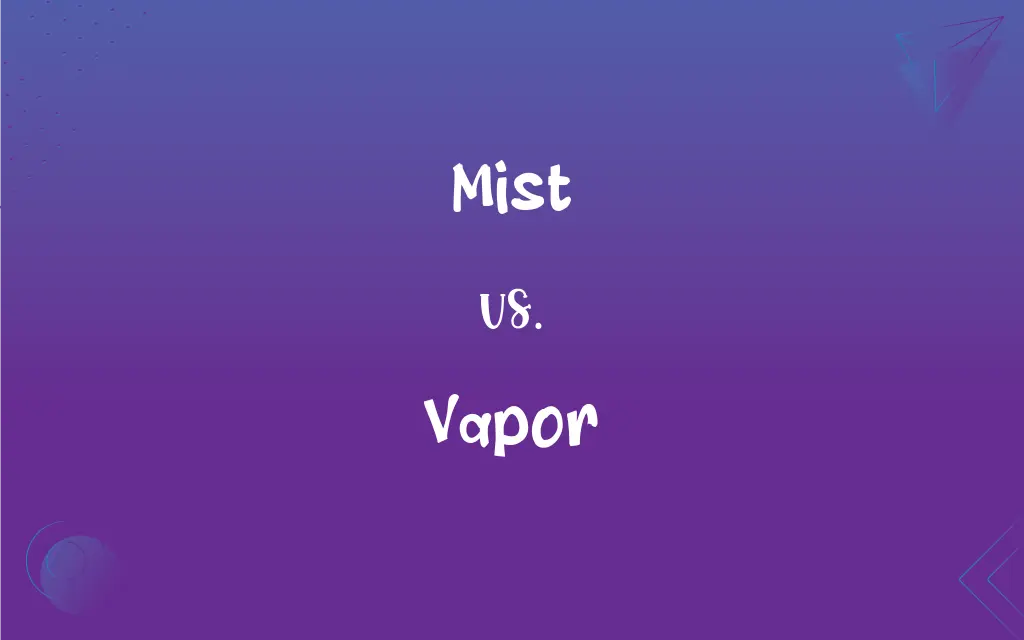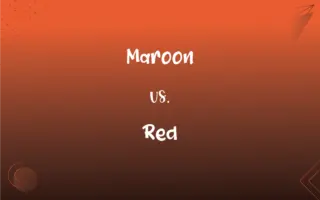Mist vs. Vapor: What's the Difference?
Edited by Aimie Carlson || By Harlon Moss || Updated on November 8, 2023
Mist is a thin fog of tiny water droplets in the air, while vapor is a gaseous state of a substance that is normally liquid or solid at room temperature.

Key Differences
Mist is formed when tiny water droplets are suspended in the air, typically when water vapor condenses at a low level. This phenomenon is often observed when warm, moist air suddenly cools. Vapor, on the other hand, refers to the gas phase of a substance that has evaporated from its liquid or solid state but is not yet dispersed into the atmosphere.
Mist usually creates a visible haze that can reduce visibility but often clears quickly and does not rise far above the ground. It is common in geographical areas where warm and cool air meet. Vapor is not always visible and can rise high into the atmosphere; it represents a stage where the substance is in transition between its liquid or solid state and its gaseous state.
Mist can make outdoor conditions appear mystical and is often associated with cool weather or the transition between night and day. It is not the same as fog, which is denser and lasts longer. Vapor can exist at various temperatures and is often associated with processes like boiling, evaporation, or sublimation.
In literature, mist is often used metaphorically to signify mystery or something that obscures clarity. Vapor is less commonly used in metaphors but might symbolize transience or something fleeting. Both terms carry distinct connotations beyond their meteorological and scientific meanings.
While mist is primarily composed of water and appears in specific weather conditions, vapor can be composed of any substance that can change into its gaseous form. In some contexts, "vapor" may also refer to something unsubstantial or lacking in permanence, beyond its physical state.
ADVERTISEMENT
Comparison Chart
Composition
Tiny water droplets
Gas phase of a substance
Visibility
Visible as a fine spray or haze
May or may not be visible
Formation
By condensation at low levels
By evaporation or sublimation
Duration and Density
Short-lived and less dense than fog
Duration varies; not a matter of density
Common Usage
Often related to weather conditions
Related to both physical states and processes
ADVERTISEMENT
Mist and Vapor Definitions
Mist
A mass of fine droplets on a surface.
The morning mist settled on the petals of the flowers.
Vapor
Exhalations of breath visible in cold air.
His breath formed a vapor in the chilly air.
Mist
A cloud of tiny water droplets in the air.
The valley was covered in a gentle mist at dawn.
Vapor
A substance diffused or suspended in the air.
The room was filled with the vapor of her perfume.
Mist
An atmospheric condition with reduced visibility.
The mist on the highway made driving conditions difficult.
Vapor
A visible exhalation as mist.
Vapor from the hot tea rose from the cup.
Mist
Something that blurs or obscures visibility.
The mist from the waterfall obscured the bridge.
Vapor
The gaseous form of a substance.
Water vapor is invisible.
Mist
A fine spray of any liquid.
She used a mist of essential oils to freshen the room.
Vapor
The state of a substance volatilized from a solid or liquid.
The vapor rose as the ice sublimated under the sun.
Mist
A mass of fine droplets of water in the atmosphere near or in contact with the earth.
Vapor
The gaseous state of a substance that is liquid or solid at room temperature.
Mist
Water vapor condensed on and clouding the appearance of a surface.
Vapor
A faintly visible suspension of fine particles of matter in the air, as mist, fumes, or smoke.
FAQs
Can vapor be composed of substances other than water?
Yes, vapor can be from any substance that turns into gas.
Is mist considered a type of precipitation?
No, mist is not classified as precipitation.
Does mist occur indoors?
Rarely, as it usually forms in open air due to specific weather conditions.
Is mist always made of water?
Yes, mist is typically composed of tiny water droplets.
Is vapor visible when it forms?
Vapor can be visible or invisible, depending on the substance and conditions.
Does mist affect weather forecasting?
Yes, it can be a factor in predicting weather changes.
Is vapor always related to temperature?
Vapor formation is often related to temperature but also to pressure.
Can vapor be harmful to inhale?
It depends on the substance; some vapors can be toxic.
Can vapor exist in a vacuum?
Yes, vapor can exist in a vacuum as it is a gas.
Is mist a cloud?
Mist can be considered a low-lying cloud.
Can mist be artificially created?
Yes, mist can be artificially created with misting systems.
Can mist be colored?
Artificially created mist can be colored with lights, but natural mist is not colored.
Can vapor condense back into a liquid?
Yes, when vapor cools, it can condense back into liquid form.
Does vapor pressure have an effect on boiling point?
Yes, vapor pressure directly affects the boiling point of substances.
Can mist form indoors?
Mist typically forms outdoors, but fine sprays used indoors are also called mist.
Does the presence of vapor always mean a substance is at its boiling point?
No, substances can emit vapor below their boiling point.
Is mist dangerous for driving?
Yes, mist can reduce visibility and make driving hazardous.
Are mist and fog the same?
No, fog is denser and lasts longer than mist.
Does vapor contribute to humidity?
Yes, water vapor is a primary component of humidity.
Is vapor a sign of chemical change?
Vapor can be a sign of a physical change (evaporation) or a chemical change if a reaction occurs.
About Author
Written by
Harlon MossHarlon is a seasoned quality moderator and accomplished content writer for Difference Wiki. An alumnus of the prestigious University of California, he earned his degree in Computer Science. Leveraging his academic background, Harlon brings a meticulous and informed perspective to his work, ensuring content accuracy and excellence.
Edited by
Aimie CarlsonAimie Carlson, holding a master's degree in English literature, is a fervent English language enthusiast. She lends her writing talents to Difference Wiki, a prominent website that specializes in comparisons, offering readers insightful analyses that both captivate and inform.































































